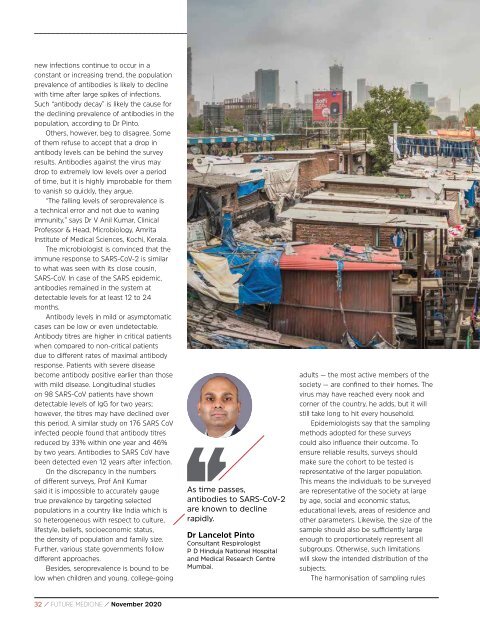FM November2020 Digital P
Create successful ePaper yourself
Turn your PDF publications into a flip-book with our unique Google optimized e-Paper software.
new infections continue to occur in a<br />
constant or increasing trend, the population<br />
prevalence of antibodies is likely to decline<br />
with time after large spikes of infections.<br />
Such “antibody decay” is likely the cause for<br />
the declining prevalence of antibodies in the<br />
population, according to Dr Pinto.<br />
Others, however, beg to disagree. Some<br />
of them refuse to accept that a drop in<br />
antibody levels can be behind the survey<br />
results. Antibodies against the virus may<br />
drop to extremely low levels over a period<br />
of time, but it is highly improbable for them<br />
to vanish so quickly, they argue.<br />
“The falling levels of seroprevalence is<br />
a technical error and not due to waning<br />
immunity,” says Dr V Anil Kumar, Clinical<br />
Professor & Head, Microbiology, Amrita<br />
Institute of Medical Sciences, Kochi, Kerala.<br />
The microbiologist is convinced that the<br />
immune response to SARS-CoV-2 is similar<br />
to what was seen with its close cousin,<br />
SARS-CoV. In case of the SARS epidemic,<br />
antibodies remained in the system at<br />
detectable levels for at least 12 to 24<br />
months.<br />
Antibody levels in mild or asymptomatic<br />
cases can be low or even undetectable.<br />
Antibody titres are higher in critical patients<br />
when compared to non-critical patients<br />
due to different rates of maximal antibody<br />
response. Patients with severe disease<br />
become antibody positive earlier than those<br />
with mild disease. Longitudinal studies<br />
on 98 SARS-CoV patients have shown<br />
detectable levels of IgG for two years;<br />
however, the titres may have declined over<br />
this period. A similar study on 176 SARS CoV<br />
infected people found that antibody titres<br />
reduced by 33% within one year and 46%<br />
by two years. Antibodies to SARS CoV have<br />
been detected even 12 years after infection.<br />
On the discrepancy in the numbers<br />
of different surveys, Prof Anil Kumar<br />
said it is impossible to accurately gauge<br />
true prevalence by targeting selected<br />
populations in a country like India which is<br />
so heterogeneous with respect to culture,<br />
lifestyle, beliefs, socioeconomic status,<br />
the density of population and family size.<br />
Further, various state governments follow<br />
different approaches.<br />
Besides, seroprevalence is bound to be<br />
low when children and young. college-going<br />
As time passes,<br />
antibodies to SARS-CoV-2<br />
are known to decline<br />
rapidly.<br />
Dr Lancelot Pinto<br />
Consultant Respirologist<br />
P D Hinduja National Hospital<br />
and Medical Research Centre<br />
Mumbai.<br />
adults — the most active members of the<br />
society — are confined to their homes. The<br />
virus may have reached every nook and<br />
corner of the country, he adds, but it will<br />
still take long to hit every household.<br />
Epidemiologists say that the sampling<br />
methods adopted for these surveys<br />
could also influence their outcome. To<br />
ensure reliable results, surveys should<br />
make sure the cohort to be tested is<br />
representative of the larger population.<br />
This means the individuals to be surveyed<br />
are representative of the society at large<br />
by age, social and economic status,<br />
educational levels, areas of residence and<br />
other parameters. Likewise, the size of the<br />
sample should also be sufficiently large<br />
enough to proportionately represent all<br />
subgroups. Otherwise, such limitations<br />
will skew the intended distribution of the<br />
subjects.<br />
The harmonisation of sampling rules<br />
32 / FUTURE MEDICINE / November 2020

















